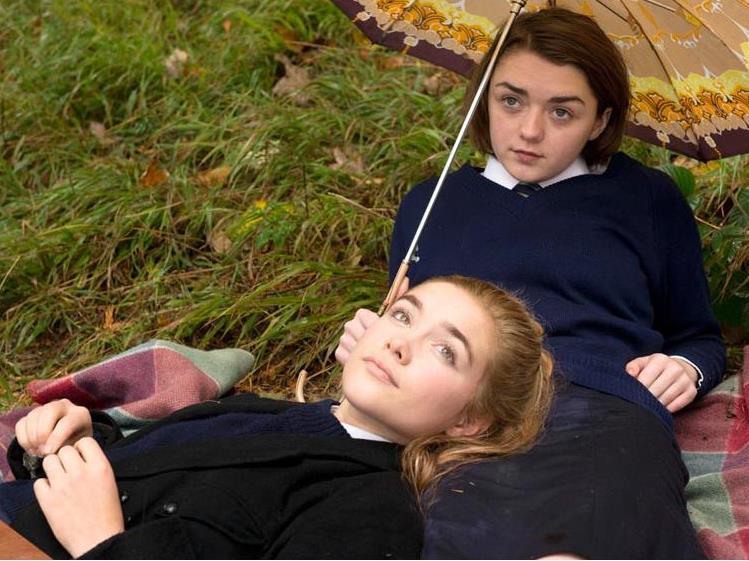Image: acmi.net.au
It is with a series of physical fumbles, stumbles and tumbles that British writer/director Carol Morley (Dreams of a Life) contemplates the confused reality of being a teenage girl. With her third feature The Falling, the filmmaker is far from the first to equate the onset of maturity with moodiness, strange movements, and even the realisation of mortality, as the previous likes of Picnic at Hanging Rock and The Virgin Suicides have proven. Morley doesn’t just retrace the space already traversed by her predecessors, though, but weaves her own atmospheric, absorbing expression of feminine adolescence.
Her characters – particularly firm best friends forever Lydia (Maisie Williams, TV’s Game of Thrones) and Abbie (newcomer Florence Pugh) – are products of their time and place, attending an all-girls school in 1969; however they’re also manifestations of children becoming women at differing extremes. When the primary duo isn’t carving their initials into a tree as a symbol of their dedication to each other, the former is reluctant and wilful as change rears its head, while the latter rushes to embrace her newfound sexuality. Tragedy brings their viewpoints together, as made tangible in spontaneous, sporadic bouts of swooning, fainting and seizing. First Lydia and then her classmates start rising from their chairs and falling to the ground, with no apparent cause for their behaviour.
The reasoning for the strange epidemic troubles headmistress Miss Alvaro (Monica Dolan, Pride) and stern teacher Miss Mantel (Greta Scacchi, A.D. The Bible Continues), but not Morley; hers is an effort that gives feelings and neuroses filmic form rather than tries to explain them. With casting the same imprint experienced by her schoolgirl charges seemingly the director’s primary concern, she crafts a film as jarring and feverish as the blackouts she depicts. The lush visuals, combining pastoral scenery with interior claustrophobia under cinematographer Agnès Godard’s (Bastards) guidance; the fits and spurts of Chris Wyatt’s (Partisan) editing, sometimes rapid-fire and hallucinatory, sometimes languid and patient; the ethereal sounds of Tracy Thorn’s (former vocalist for Everything but the Girl) hauntingly melodic soundtrack: as the words of Wordsworth, uttered aloud in the feature, intimate, they all combine to create cinematic poetry.
Tasking her young actresses with conveying such an enigmatic display of emotion, Morley also coaxes out complex performances to add to her brooding yet beautiful movie. The visual differences of the central pair act as shorthand for the diverse temperaments they portray, though The Falling‘s true journey charts the fading of the lines between the two. As the ailment some deem hysteria monopolises the action, Williams and her other teen-aged co-stars embark upon a dance in everything but name, their sudden gestures imparting a sense of rhythm amidst the prevailing tone of mystery. In inserting overt theatricality into a restrained setting, they also effectively communicate the feature’s other example of breaking down boundaries of what is considered proper behaviour, both specific to Britain of the period, and to women.
Less successful are the raft of subplots that span Lydia’s home life, specifically involving her agoraphobic hairdresser mother (Maxine Peake, The Theory of Everything) and her hormonal older brother (Joe Cole, A Long Way Down). Though providing ample fuel to flesh out the character beyond the classroom, they rankle with the one element the remainder of the film steadfastly avoids: certainty. Here, Morley forgoes teasing her themes to make events plain, and comes across as clumsy for doing so. The Falling rises when it attempts to capture something that can’t be put into words, but mirrors its name when it turns to neatness over the unknowable.
Rating: 3.5 stars out of 5
Director: Carol Morley
UK, 2014, 102 mins
Australian Centre for the Moving Image
29 June – 26 July
Actors:
Director:
Format:
Country:
Release:





